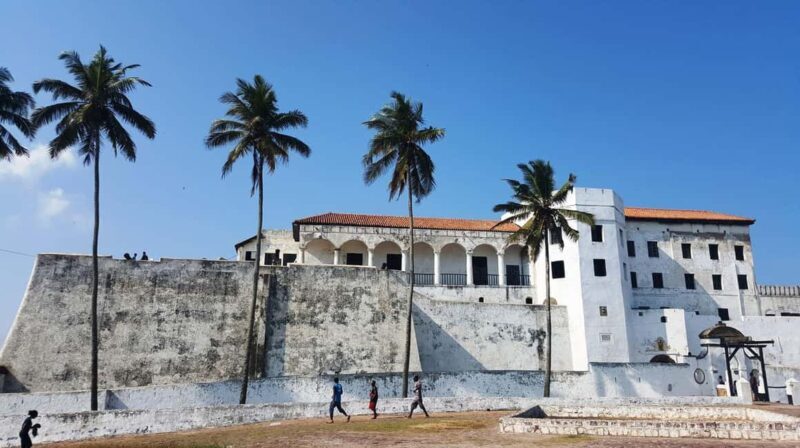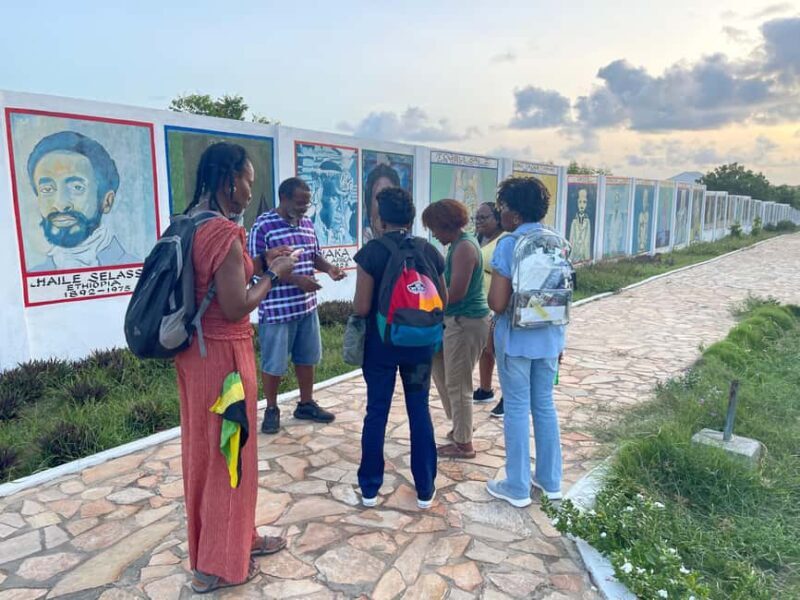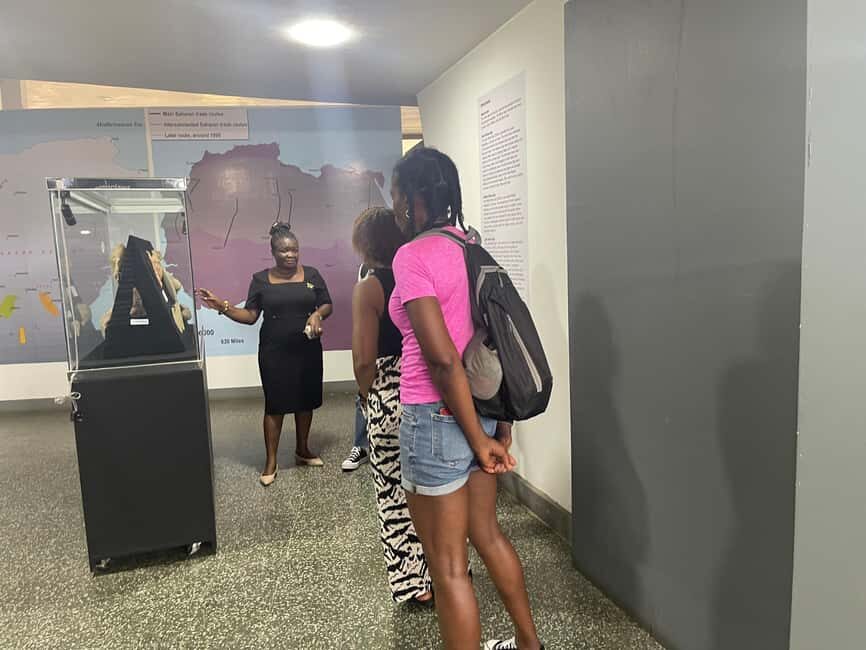Traveling to Ghana on the Return of the Diaspora tour promises more than just sightseeing — it’s a chance to reconnect with African heritage, explore vibrant cities, and reflect on history through immersive experiences. This carefully curated 10-day journey takes travelers from bustling Accra to the poignant sites of Cape Coast and Elmina, blending cultural exploration, historical insight, and natural beauty into a comprehensive package.
What makes this tour especially appealing? First, the focus on significant landmarks like forts, castles, and museums offers a meaningful perspective on Ghana’s past. Second, the mix of cultural sites and artistic scenes in Accra provides a well-rounded view of contemporary Ghanaian life. Third, the itinerary’s balance of history, nature, and leisure makes for a memorable and authentic adventure.
A potential consideration is the length of travel days — especially the long drive back from Cape Coast to Accra on Day 8. While the journey offers a chance to rest and reflect, some travelers might prefer more frequent breaks or shorter travel segments.
This tour suits individuals seeking a profound cultural experience, those interested in African history, or travelers eager to explore Ghana beyond typical tourist spots. It’s ideal if you’re ready for an engaging, educational, and visually stunning adventure.
- Key Points
- An In-Depth Look at the Tour Experience
- Arrival and Welcome in Accra
- Exploring Accra’s Cultural Heart
- Taking in Accra’s Historic Forts and Castles
- Ghana’s Art Scene and Creative Vibe
- Visiting Nkyinkyim Museum and Ancestral Wall
- Cape Coast: Heart of the Slave Trade
- Nature and Adventure at Kakum National Park
- Leisure and Reflection in Ghanaian Countryside
- Relaxing in Nature and Gardens
- Shopping, Reflection, and Departure
- The Tour’s Value and Practicality
- Transportation and Group Size
- Meals and Additional Costs
- Who Will Love This Tour?
- Final Thoughts
- FAQ
- More Food & Drink Experiences in Accra
- More Tours in Accra
- More Tour Reviews in Accra
- Still browsing? Here are more Accra experiences we've covered recently
Key Points

- Authentic Cultural Encounters: Visit key sites like Kwame Nkrumah Mausoleum, forts, castles, and museums to understand Ghana’s history.
- Vivid Artistic Experiences: Explore Accra’s vibrant art scene at Nubuke Foundation, Artists Alliance Gallery, and The 57 Gallery.
- Historical Significance: Walk through Cape Coast and Elmina castles, places that tell the stories of the transatlantic slave trade.
- Natural Beauty and Adventure: Experience Kakum National Park’s canopy walkway and relax at Aburi Gardens.
- Comprehensive Itinerary: The tour balances history, art, culture, and leisure, offering a well-rounded Ghanaian experience.
- Value for Price: At $3,460, the package includes accommodations, expert guides, site admissions, and most meals, providing a thorough introduction to Ghana.
An In-Depth Look at the Tour Experience
Looking for more options in Accra? We've reviewed plenty of other experiences.
Arrival and Welcome in Accra
The journey begins with a warm welcome at Kotoka International Airport, where a meet-and-assist service ensures smooth transfer to your hotel. That first evening, you’ll enjoy a welcome dinner coupled with a cultural orientation session, complete with a lecture on African culture. Many reviewers noted the value of this introduction — it helps contextualize what you’ll see in the days to come. You might even find local dressmakers offering to craft custom-made African outfits, adding a personal touch to your experience.
Exploring Accra’s Cultural Heart
Day 2 is all about capturing Ghana’s spirit through its museums and monuments. Visiting the National Museum of Ghana provides insights into the country’s history and artistic evolution. The Kwame Nkrumah Mausoleum is a highlight — a peaceful space dedicated to Ghana’s first president, where the architecture and serene surroundings give a sense of national pride. The Art and Craft Center offers vibrant souvenirs, perfect for those looking to take a piece of Ghana home. The W.E.B. Du Bois Center adds a literary dimension, celebrating an influential figure in Pan-African history.
Many past travelers appreciated the guided tours’ depth, with one noting that the guide’s storytelling brought history to life. As one guest put it, “The museums and mausoleum are well-curated, making history accessible and engaging.”
Taking in Accra’s Historic Forts and Castles
On Day 3, you’ll visit Usher Fort, James Fort, Christiansborg Castle (Osu Castle), and Fort Jameson. These sites stand as reminders of Ghana’s colonial past and its central role in the transatlantic slave trade. Visitors have found these experiences particularly moving, especially at Cape Coast and Elmina castles later in the trip. One reviewer mentioned, “Walking through these forts, you can’t help but reflect on the stories of millions who endured so much history here.”
More Great Tours NearbyGhana’s Art Scene and Creative Vibe
Day 4 introduces you to Accra’s thriving art scene. The Nubuke Foundation, Artists Alliance Gallery, and The 57 Gallery showcase contemporary Ghanaian art. Visitors often comment on the colorful, vibrant atmosphere — a stark contrast to the somber history, but equally compelling. The art spaces offer a window into Ghanaian culture and daily life, making this a memorable experience for lovers of visual arts.
Visiting Nkyinkyim Museum and Ancestral Wall
Day 5 takes you east to the Nkyinkyim Museum in Nuhalenya-Ada. This evolving space blends African art with history, and the Ancestral Wall features portraits honoring influential figures. One traveler appreciated this peaceful, educational stop, noting how it “adds a personal connection to the broader history of Africa.”
Cape Coast: Heart of the Slave Trade
On Days 6 and 7, you’ll visit Cape Coast Castle and Elmina Castle, two of the most significant sites in Ghana. Cape Coast Castle, established in 1555 and expanded over centuries, is a haunting reminder of the brutal slave trade. The guided tours are often described as emotional and powerful, with many visitors emphasizing the importance of understanding this history. The slave markets and river nearby deepen the experience, showcasing the logistical side of the trade.
Elmina Castle, built in 1482 by the Portuguese, is the oldest European structure in sub-Saharan Africa. The contrast between the two castles offers a comprehensive view of European influence. Past reviewers have praised the on-site guides for their knowledge, making the history palpable.
Nature and Adventure at Kakum National Park
Day 7 also features the Kakum National Park canopy walkway. Many travelers describe this as a highlight — a thrilling walk above the treetops with stunning views of Ghana’s lush forests. The biodiversity here is impressive, and the experience offers a perfect break from heavy history. Expect some zigzagging over the treetops, which is both fun and slightly nerve-wracking, but ultimately rewarding.
Leisure and Reflection in Ghanaian Countryside
Day 8 is a return trip to Accra, giving you a chance to rest and enjoy some nightlife. Past guests have enjoyed exploring local markets, trying street food, or simply relaxing at the hotel after days of sightseeing.
Relaxing in Nature and Gardens
The final full day (Day 9) is dedicated to relaxation and natural beauty. Visiting the Aburi Botanical Gardens offers scenic views and peaceful walks. The Safari Valley Resort adds a touch of adventure with its lush surroundings, and the Aseneman Waterfall provides a calming, picturesque spot. Several reviews mention how this day balances out the intense historical sites with moments of tranquility and natural beauty.
Shopping, Reflection, and Departure
On Day 10, you’ll have time for last-minute shopping before heading to the airport. Many travelers mention the souvenirs from the art centers and markets as memorable keepsakes. The convenience of round-trip airport transfers ensures a smooth end to the journey.
The Tour’s Value and Practicality
At $3,460 per person, this tour covers a lot. It includes accommodations, transportation in private air-conditioned vehicles, site admissions, meals (mostly breakfast and some dinners), and the guidance of experienced local guides. These elements combine to provide a comprehensive, well-organized experience that’s worth the investment for those seeking meaningful culture.
The inclusion of site visits like Cape Coast and Elmina castles means you’re paying for deeply educational and emotional experiences. The tour also offers a flexible “reserve and pay later” option, which appeals to travelers who like to keep their plans open until closer to departure.
Transportation and Group Size
Traveling in a private, air-conditioned vehicle means comfort and flexibility, especially during longer drives between Cape Coast and Accra. While the exact group size isn’t specified, tours like this typically keep groups manageable, allowing for personalized attention and easier interaction.
Meals and Additional Costs
Most meals are included, but some expenses like personal items, drinks, and optional extras (like tailored outfits) are not. Travel insurance and visas are not included, so travelers should plan accordingly.
Who Will Love This Tour?

This experience is perfect for those who want to connect deeply with African roots, history, and culture. It’s suited for history buffs, art lovers, and anyone curious about Ghana’s role in world history. The mix of activities balances education with leisure, making it appealing for solo travelers, couples, or groups ready for an enriching adventure.
Final Thoughts

If you’re looking for a thoughtful, well-rounded journey into Ghana’s past and present, this tour offers a meaningful way to do so. You’ll walk through centuries of history, admire vibrant art scenes, and enjoy stunning natural sights, all while having the comfort of organized logistics and expert guides.
The Return of the Diaspora tour provides an authentic Ghanaian experience that nurtures understanding and appreciation of this extraordinary country. It’s a chance to reflect on history, embrace culture, and appreciate the beauty that Ghana offers — making it an excellent choice for travelers seeking a heartfelt, educational escape.
FAQ
What’s included in the price?
The $3,460 fee covers accommodations, airport transfers, transportation in private air-conditioned vehicles, site admissions, guide services, and most meals (breakfasts and some dinners).
Are there optional extras not included?
Yes, items like visas, travel insurance, personal expenses, drinks, and souvenirs are not covered. You might also want to consider costs for vaccines or additional meals not listed.
How long are the travel days?
Some days involve long drives, particularly returning from Cape Coast to Accra on Day 8. This offers a chance to relax and reflect, but travelers should be prepared for extended road time.
What kind of guides will I have?
An experienced local guide accompanies the tour, providing insightful commentary on all sites visited. Guests have praised guides for their knowledge and engaging storytelling.
Is the tour suitable for families or solo travelers?
While the tour is flexible, it’s best suited for adults interested in history, culture, and meaningful experiences. Families with older children who are comfortable with walking and travel may also enjoy it.
How physically demanding is the itinerary?
Expect some walking at sites like castles and museums, and a canopy walk at Kakum National Park. The pace is balanced, but comfort with walking is advised.
What’s the best time of year to go?
While not specified, Ghana has a tropical climate with a rainy season from April to October. The dry season (November to March) generally offers the best weather for sightseeing.
Are there opportunities for shopping?
Yes, at art centers and markets, you can purchase souvenirs, crafts, and custom clothing, often highlighted as memorable parts of the trip.
Can I customize the experience?
While the itinerary is set, some tours offer optional activities or personalized add-ons — inquire with Olives Travel and Tour Ghana for specifics.
What should I bring?
Travelers should pack comfortable walking shoes, sun protection, a camera, and personal items. Notify the tour provider of any allergies or special needs before departure.
This detailed review aims to give you a clear picture of what to expect and why this Ghana tour can be a transformative experience for those eager to explore African roots with authenticity and comfort.
You can check availability for your dates here:More Food & Drink Experiences in Accra
More Tours in Accra
More Tour Reviews in Accra
Still browsing? Here are more Accra experiences we've covered recently
- Explore Aburi Botanical Gardens And Boti Falls
- Accra to Aqua Safari Resort Eco-Friendly Tour with Meal
- African Naming Ceremony
- Accra: Cocoa Farm & Waterfalls Tour
- ACCRA GUIDED CITY TOUR, GHANA
- Accra Slave Tour
- Traditional Beadmaking Workshop
- 10 Days Heritage, History and Adventure Tour in Ghana
- Accra: Whirlwind Guided City Tour by Car with Entry Fees
- Accra: Guided 10-Day Panafest Festival 2025 Tour
- From Accra: The Cape Coast Day Tour Guided Experience
- Ghana: 3 Days Sightseeing
